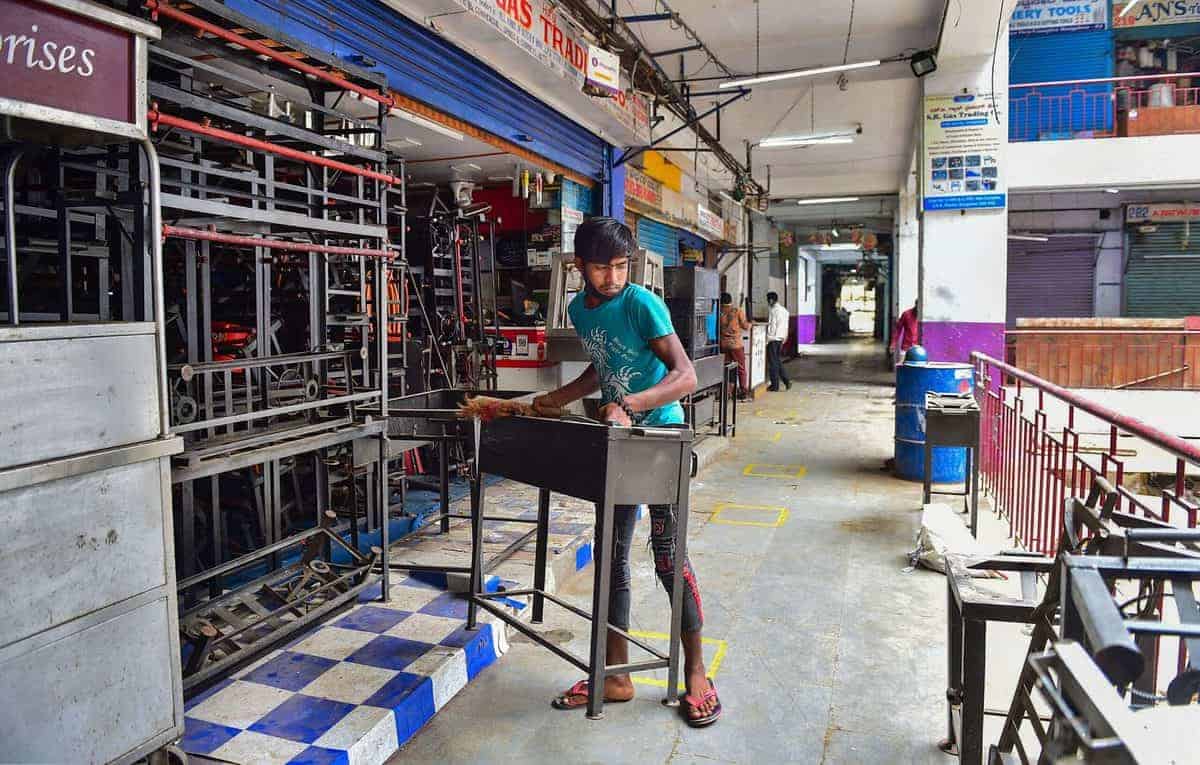Karnataka has begun opening up its economic activities, social, sports and educational institutions in a gradual manner under the Unlock 0.4. The State Government announced a slew of measures to restore operation of several civic activities from September 1. Elaborate Standard Operating Procedures (SOP) have been put in place to enforce the social-distancing norms all across the facilities in view of the pandemic which however does not show any slackening pace.
First to open up is the iconic Krishna Rajendra Market in the downtown Bengaluru which has been shut for the last five month robbing jobs of nearly 20,000 workers who worked as vendors, suppliers, porters, transporters and scavengers. The Market has nearly 2, 200 shops selling fruits, flowers, vegetables, spices and other food additives. The vendors have seen popular festive seasons like Ramzan, Varamahalakshmi, Vinayaka Chaturthi and Ugadi pass by without any prospects for sales and income. They are now eyeing Dasserah, which is the major shopping season for the people of the State to buy new clothes and utensils, for compensating losses incurred during the last five months.
Less-crowded Metro Rail
The services on Bangalore Metro Rail are set to resume from September 7 but will be allowed to carry only one-sixth of their capacity due to the social-distancing norms in place. The Bangalore Metro Rail Corporation (BMRCL) has been incurring a loss of Rs. 22 crore of fare revenue every month during the last five-month shutdown. Currently, the Metro has two operational lines Green Line (East to West) and Purple Line (North to South) on a 42-km network. BMRCL’s monthly expenditure is about Rs. 400-500 crore per month, a major part of which is spent on project financing.
Classes for UG, PG students
Physical classrooms have been permitted for Undergraduate and Postgraduate students in college and universities from October 1. However, hostel inmates will not be permitted to step out unless they are heading for classrooms or for libraries. Hostels are installing foot-operated sanitizers, hand guns for checking temperatures of entrants and will allow only final year students for the first few months to avoid crowding.
The schools—from class 9th to 12th standard—will however only allow visits by students from September 21 to seek guidance from teachers. However several riders will regulate this. The visits will have to be with parents’ written consent and should be located outside the containment zones.
Children at risk
However, there is not much enthusiasm among parents as most of them fear risking health of their children. Hundreds of parents are writing to the heads of the private management schools to allow ‘a gap year’ for the students while several hundreds have withdrawn them from schools. While the high-end schools have collected fee and conducting online classes, the ones catering to educational needs in lower middle class neighbourhoods are reporting no fresh admissions and no fee collection for the new academic session which is already three months behind the schedule. There has been criticism about online classes as children complain of disconnect between them and teachers. Poor parents unable to afford smart-phones—let alone computers or laptops—see bleak prospects for their stay-home kids. However, there is no one to lend an ear to the teachers of private schools who have not been paid salaries for the last five months.
The State has permitted pubs, bars and social clubs to open from September 1 but similar permission has not been granted to swimming pools and cinema theatres. The former (pubs and bars) have been allowed to permit customers only for 50 per cent of their capacity. Several of them are going for prior booking for 6-9 pm and 9-12 pm slots as no walk-in customers would be entertained. The State’s Excise Department has reported losses to the tune of Rs. 1,435 crore due to shutdown of liquor outlets. Long queues of liquor users were seen when the Government allowed sale of liquor on June 7 as part of Unlock 0.1. The city which has won for itself the reputation of being ‘India’s Pub City’ has a huge youth workforce that dedicates itself evenings to pubs and clubs.
Although the film shootings can start, the cinema theatres will remain shut. Nearly 35 new Kannada films—10 of them big ticket—are waiting release in the State. Karnataka Film Chamber of Commerce has pointed out that the theatres will require at least two months to put in place the social-distancing infrastructure whenever it is permitted to screen films.
With marriage season in offing, the new SOPs allow a gathering of a 100 persons for marriage functions from September 21. The funeral gatherings will however allow only 20 persons. Other gatherings—religious, political and social too—would allow a maximum of 100 persons from September 21.
With the new SOPs in place, it is expected that Bangalore’s nightlife will come alive. Being a hub of IT industries, the city has drawn a vast and highly professional workforce from across the country. With most of them working from homes, the city’s markets, restaurants and shopping malls have been wearing a deserted look. A large unskilled workforce working for restaurants, apartments and shopping malls has gone back to their native states, mainly the North East, Bihar, Uttar Pradesh, Rajasthan and Odisha. Over 300 Shramik Expresses carried more than 4.5 lakh workers to their distant hometowns between June 3 and August 15.
COVID-19 Toll So Far in Karnataka
- Death toll in Karnataka till Aug. 30: 5,837
- Active cases as on Aug. 30: 91,000
- Total Infected in the State till Aug. 30: 3,51,481
- Bangalore’s positivity rate is 15.11%.
- In the last week of August the State had 64,079 positive cases.
- Per day around 9,000 new cases are being reported.
- Bangalore city alone reports around 30% of cases.
Mysuru, Ballari, Davangere, Belgavi (formerly Belgaum), Dakshina Kannada (Mangalore dist.) follow in order.
M.A. Siraj is a senior journalist based in Bengaluru

